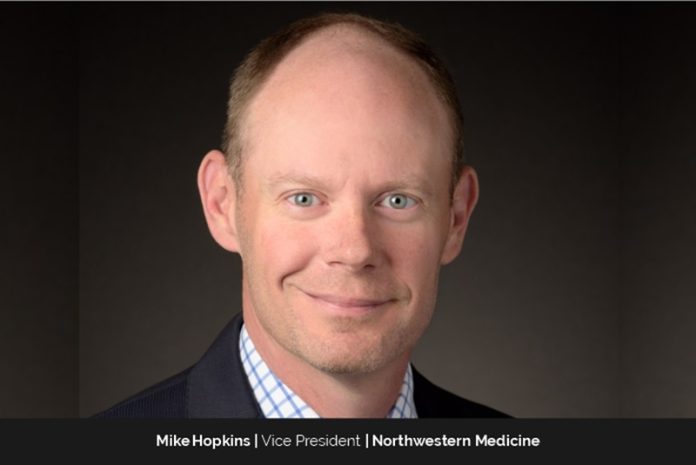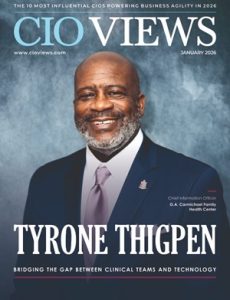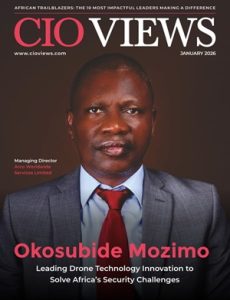In the complex and fast-paced world of healthcare supply chain management, few leaders have demonstrated the foresight and innovation of Mike Hopkins, Vice President at Northwestern Medicine.
With roots deeply embedded in the healthcare sector, thanks to his early exposure through his mother’s nursing career, Mike’s journey has been marked by a unique blend of clinical insight and strategic acumen. This perspective has not only propelled him to the forefront of supply chain leadership but has also driven transformative changes across Northwestern Medicine.
His pioneering efforts in developing and implementing the Northwestern Supply Chain Operating System (NWSCOS), coupled with his commitment to Lean principles, advanced technologies like RFID, and Kanban methodologies, have set new standards for operational excellence and efficiency.
Mike’s proactive approach to team building and his unwavering focus on problem-solving make him a standout figure in the industry, continually pushing the boundaries of what is possible in healthcare supply chain management.
Early Influences Shape a Career in Healthcare Supply Chain
Mike attributes his early interest in healthcare supply chain management to his mother, a nurse. “Due to her influence, I understood the importance of supply chain from a clinical aspect earlier and better than most,” he recalls. This unique understanding, garnered at a young age, allowed him to forge strong relationships with clinical partners.
These relationships became a crucial catalyst for his growth into supply chain leadership. “Building those connections early on gave me an edge in understanding the practical needs of healthcare supply chains,” Mike notes, reflecting on the formative impact of his mother’s career on his professional journey.
Transforming Operations through Lean Management
At Northwestern Medicine, Mike has spearheaded the development and implementation of the Northwestern Supply Chain Operating System (NWSCOS), a transformative strategy based on Lean management principles. “The NWSCOS is the foundational base of all our supply chain activities and improvements,” he explains.
This system, meticulously tailored for healthcare applications, has significantly enhanced operational excellence and efficiency within the organization. “We have tweaked and added to the Lean framework as necessary to create something that is specifically useful for our healthcare context,” Mike adds, underscoring the innovative adaptation of Lean principles to meet unique industry needs.
Key Process Improvement Initiatives
Mike emphasizes that the NWSCOS underpins all process improvements within Northwestern Medicine’s supply chain. “From a process improvement perspective, nothing we do could be improved as well and as fast without the foundational tools that this system gives our teams,” he asserts.
This system’s tools enable rapid and effective improvements across various supply chain activities. “The NWSCOS provides a structured yet flexible framework that our teams rely on to drive continuous improvement and operational efficiency,” he says, highlighting the transformative impact of the system on the organization’s supply chain operations.
Building Effective Teams with a Proactive Approach
Believing in proactive care, Mike extends this philosophy to his supply chain teams, focusing on their mental health and personal happiness. “I incorporate this belief into our teams’ work and ensure we are all taking care of each other,” he notes.
Mike prioritizes hiring individuals with the right team attitude and caring personality, rather than just impressive resumes, to foster a supportive and collaborative environment. “Hiring the right people is crucial. It’s not just about their skills on paper, but their ability to work well within a team and share a common goal of caring for one another,” he explains, reflecting his commitment to a holistic approach to team building.
Lean Principles as a Foundation
Exposed to Lean principles around 2000, Mike finds their simplicity and common-sense approach deeply resonant. “The simplicity and common-sense approach Lean takes really resonated with me as a basis of something that could be understood and utilized easily from every level of a supply chain organization,” he states.
These principles are embedded in every aspect of Northwestern Medicine’s supply chain management and procurement processes. “Lean principles have become the bedrock of our operational strategy. They are fundamental to everything we do, from daily operations to long-term strategic planning,” Mike emphasizes.
Kanban’s Impact on Workflow and Inventory Management
Implementing Kanban has streamlined commodity supply management across Northwestern Medicine’s acute care and some non-acute facilities. “It has created a simplistic yet very effective way to not only manage supplies on a day-to-day basis, but a way to measure and manage having the right amount of inventory,” Mike explains.
This system has reduced waste from over-inventorying, a common issue in healthcare. “Healthcare, in general, suffers from an over-inventorying problem, and that in turn creates a lot of waste within expired and obsolete supplies. Kanban gives us a great tool to be able to obtain data to manage and reduce that waste,” he adds, underscoring the system’s efficiency in optimizing inventory management.
Leveraging RFID Technology for Enhanced Visibility
With 13 years of experience using RFID technology, Mike’s team has implemented it across all operating rooms, catheterization labs, electrophysiology, interventional radiology, and gastrointestinal suites within Northwestern Medicine’s acute care facilities.
“This not only gives us great visibility to be able to easily manage recalls and expiring products much more effectively, but it also gives us the ability to ensure we have the right amount of inventory present to be financially prudent while being clinically effective,” he highlights.
The enhanced visibility and tracking capabilities provided by RFID technology have been instrumental in improving supply chain management and patient care. “RFID technology ensures that we are not only compliant with regulations but also operating efficiently and cost-effectively,” Mike explains, noting the multifaceted benefits of this advanced tracking system.
Essential Components of Successful Logistics Management
Effective problem-solving and maintaining simplicity are critical to successful logistics management in healthcare, according to Mike. “The key is to be able to teach your team to be problem solvers and use the tools, in our case, the NWSCOS, to get to the root cause and actually fix and not band-aid issues,” he emphasizes.
Addressing root causes rather than just symptoms ensures a streamlined and efficient supply chain. “Unfortunately, issues arise which need to be resolved. What I have seen in my career is people solving the end problem and not the root cause. This generally causes complexity and additional failure points within your supply chain and gives additional complexities to manage towards,” he elaborates, advocating for a proactive and thorough approach to problem-solving.
Strategic Purchasing Decisions for Cost Optimization
Mike underscores the importance of strategic partnerships and logical unit-of-measure philosophy in purchasing decisions. “We utilize our distribution partner as our ‘warehouse,’ so their partnership is very important to our logical unit-of-measure philosophy,” he explains. This approach simplifies the put-away process and maximizes opportunities for bulk purchasing at discounted rates.
“We try and drive as much volume through distribution as possible to make the put-away process as standard and simple as we can. We are also in development with our distribution partner to maximize our 3PL process so we can look at opportunities to be able to bulk buy PPI at a discount and still be able to distribute internally by each,” Mike adds, detailing the strategic initiatives aimed at optimizing operations and reducing costs.
The Role of Sourcing in Reliable Supply Chains
The COVID-19 pandemic highlighted the importance of reliable supply chain partners. “As much as a low price is important, the total cost and reliability of a supply chain are actually far more important,” Mike asserts. Sourcing teams must prioritize reliability and total cost of ownership over just pricing to ensure robust and reliable supply chains.
“I think COVID showed everyone that reliable supply chain partners are extremely important to the viability and reliability of a healthcare supply chain,” he notes, emphasizing the critical role of strong, dependable partnerships in maintaining a resilient supply chain.
Integrating Biomedical Engineering for Innovation and Efficiency
Biomedical engineering also incorporates Lean principles like 5S and Kanban. Mike notes that aligning biomed teams with supply chain operations enhances capital planning for equipment, allowing for accurate financial planning and budgeting. “Having the two closely attached and aligned allows us to provide our finance teams with very realistic cost planning around equipment replacement five years in advance,” he explains.
This integration facilitates long-term strategic planning and ensures the organization is well-prepared for future needs. “It allows the organization to financially plan and budget more accurately,” Mike adds, highlighting the benefits of this close alignment.
Overcoming Challenges through Cultural Change
One of the biggest career challenges Mike has faced is changing the internal culture from a reactive to a proactive supply chain team. “There needs to be a 100 percent buy-in and acceptance of what you are trying to accomplish as a team,” he stresses.
Leadership and especially the servant leadership philosophy play crucial roles in this transformation, ensuring team members know they are valued and cared for. “Without the team absolutely knowing that you personally care about their happiness and success, they will never completely buy into any process or technology,” Mike emphasizes, highlighting the importance of fostering a supportive and engaged team culture.
Advice for Aspiring Leaders
For aspiring leaders in healthcare supply chain and procurement, Mike advises focusing on teamwork and common goals. “Ensuring the team understands the needs of their ‘customer’ who is the next person/team in line of a process and focusing on not passing along defects is imperative,” he says.
Simplifying solutions and fostering a proactive problem-solving culture are key to building an effective supply chain team. “Most things are really pretty simple until people try to start solving the ‘what ifs’ and the ‘one-offs,’” he cautions, advocating for straightforward, effective solutions for the majority of instances.
“Ultimately, we all need to understand the needs of our clinical partners and patients, but at the end of the day, if we all focus on the success of the next step in a process after ourselves, everything ends up working as it should,” Mike concludes, sharing wisdom from his extensive experience in the field.
Conclusion
Mike Hopkins’s tenure at Northwestern Medicine exemplifies the impact of visionary leadership in the healthcare supply chain sector. His ability to seamlessly integrate clinical understanding with advanced supply chain strategies has not only optimized operations but also enhanced patient care and organizational efficiency.
By fostering a culture of proactive care, emphasizing the importance of team wellbeing, and prioritizing strategic partnerships, Mike has built a resilient and forward-thinking supply chain framework. His journey serves as an inspiring testament to the power of innovation, collaboration, and dedication in transforming healthcare logistics.
For aspiring leaders in the field, Mike’s experiences and achievements offer invaluable lessons in leadership, strategic planning, and the critical importance of a patient-centric approach to supply chain management. As the healthcare landscape continues to evolve, Mike Hopkins remains at the cutting edge, setting a benchmark for excellence and continually driving the industry toward a more efficient and compassionate future.





